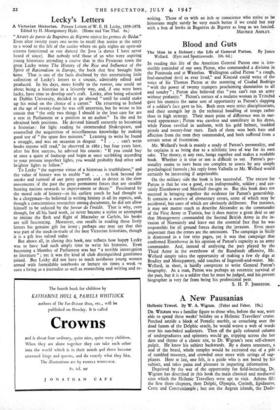Lecky's Letters
A Victorian Historian. Private Letters of W. E. H. Lecky, 1859-1878. Edited by H. Montgomery Hyde. (Home and Van Thal. 6s.) " Avamr de partir de Bagneres de Bigorre visitez les grottes de Beclat." Even after twenty years one seems to recall that notice at the entry to a wood to the left of the casino where on gala nights an open-air cinema functioned or one danced the Java (a dance I have never heard of since). But nobody told those of us who were aspiring young historians attending a course that in this Pyrenean town the great Lecky wrote The History of the Rise and Influence of the Spirit of Rationalism in Europe, the bock that first brought him tame. That is one of the facts disclosed by this entertaining little collection of Lecky's letters to a cousin, admirably edited and produced. In his days, more kindly to the rentier, one could set about being a historian in a leisurely way, and, if one were born lucky, have time to develop one's craft. Lecky, after being educated at Dublin University, decided to go abroad " until he could make up his mind on the choice of a career." On returning to Ireland at the age of twenty-four he was still' uncertain, but he wrote to his cousin that " the only two things I should in the least care for are a seat in Parliament or a position as an author." In the end he obtained both positions. He devoted himself earnestly to becoming a historian: for light reading he commended Shakespeare, and counselled the acquisition of miscellaneous knowledge by making good use of " the spare five minutes." Learning to write he found a struggle, and was on occasion in despair. "1 . . . can't write books anyone will read," he observed in 1862 ; but four years later, after his first success, he advised his cousin: "If you could buy at once a quire of foolscap and begin at once scribbling according to your present imperfect lights, you would probably find other and brighter lights to follow."
To Lecky " the supreme virtue of a historian is truthfulness," and the value of history was to enable "us . . . to look beyond the smoke and turmoil of our petty quarrels and to detect in the slow movements of the past the great permanent forces that are steadily bearing nations onwards to improvement or decay." Fascinated by the moral side of history—in his earliest youth he had thought to be a clergyman—he believed in writing history in all its aspects, and, though a conscientious researcher among documents, he did not allow himself to be seduced by the fureur de Pinedit. That is why, even though, for all his hard work, he never became a stylist or attempted to imitate the flash and flight of Macaulay or Carlyle, his books are still fascinating. Moreover, one recalls in reading these lively letters his genuine gift for irony ; perhaps one may say that this was part of the stock-in-trade of the best Victorian historians, though it is a gift less valued today. But above all, in closing this book, one reflects how happy Lecky was to have had such ample time to write his histories. Even becoming a Member of Parliament was but "a terrible interruption to literature " ; yet it was the kind of club distinguished gentlemen joined. But Lecky did not have to teach assiduous young women armed with formidable notebooks or lecture six times a week nr earn a living as a journalist as well as researching and writing and re- writing. Those of us with an itch or conscience who strive to be historians might surely be very much better if we could but stay with a box of books in Bagneres de Bigorre as long as we fancied. MAURICE ASHLEY.






































 Previous page
Previous page